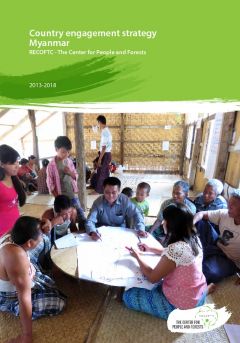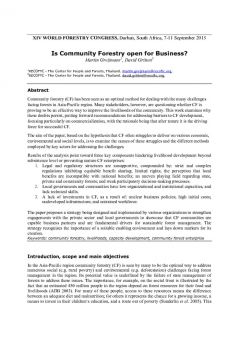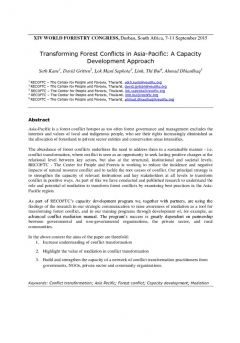Location
RECOFTC
RECOFTC is derived from an abbreviated form of the organization's legal name, Regional Community Forestry Training Center for Asia and the Pacific. Formerly the organization was known as RECOFTC – The Center for People and Forests.
RECOFTC – The Center for People and Forests is an international not-for-profit organization that focuses on capacity building for community forestry in the Asia Pacific region. It advocates for the increased involvement of local communities living in and around forests - some 450 million people in Asia-Pacific - in the equitable and ecologically sustainable management of forest landscapes.
The Regional Community Forestry Training Center for Asia and the Pacific (RECOFTC) opened in Bangkok, Thailand, in March 1987 with support from the United Nations Food and Agriculture Organization, the Government of Switzerland (through the Asian Development Bank), and Thailand's Kasetsart University.
Community forestry is widely acknowledged as a powerful solution for many of the challenges facing local people and the wider society, especially in improving rural livelihoods, enhancing community governance and empowerment, transforming forest-related conflict, protecting and enhancing the environment, and helping to fight climate change. As a capacity-building organisation, RECOFTC improves the ability of people and organisations to conduct community forestry effectively and sustainably.
RECOFTC works toward its mission through four thematic areas:
- expanding community forestry
- people, forests and climate change
- transforming forest conflict
- securing local livelihoods.
Members:
Resources
Displaying 166 - 170 of 485RECOFTC Country Engagement Strategy - Myanmar
About 32 million ha, half of Myanmar’s land area, is classified as forest area. Most of the 20 million ha of other wooded land is fallow land used by villagers for shifting cultivation. About 20 to 25 million people out of a total population of 60 million are estimated to use forests as one of their sources of livelihoods.
Democratising Forest Business: A Compendium of Successful Locally Controlled Forest Business Organizations
Forests worldwide are home to approximately 1.3 billion people and must cater to the multiple needs of people - from providing local goods and services (access to income, food, clean water, wood energy, construction materials, fertile soils, medicinal and cosmetic products, and recreation) to providing global goods and services (climate change mitigation, biodiversity conservation, hydrological and mineral cycles). It is a tall order because many of these needs compete with one another.
Building Blocks for Viable Community Forestry Enterprises
Research shows that community forestry enterprises (CFE) in community forestry (CF) sites are restricted due to a number of factors: a lack of support by governments, combined with policies that undermine CFE’s viability; misconceptions by governments that communities are unable to manage forests in a sustainable manner; and regulatory framework that favours private sector and state forest enterprises. These restrictions prevent CF members from developing and commercializing forest products, thereby only allowing them to benefit from their forests through a subsistence approach.
Is Community Forestry Open for Business?
Community forestry (CF) has been seen as an optimal method for dealing with the many challenges facing forests in Asia-Pacific region. Many stakeholders, however, are questioning whether CF is proving to be an effective way to improve the livelihoods of the community. This work examines why these doubts persist, putting forward recommendations for addressing barriers to CF development, focusing particularly on commercialization, with the rationale being that after tenure it is the driving force for successful CF.
Transforming Forest Conflicts in Asia-Pacific: A Capacity Development Approach
Asia-Pacific is a forest conflict hotspot as too often forest governance and management excludes the interests and values of local and indigenous people, who see their rights increasingly diminished as the allocation of forestland to private sector entities and conservation areas intensifies.






